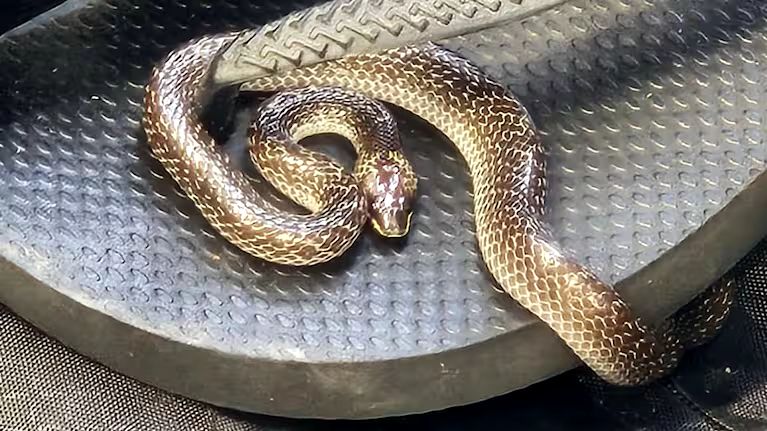Top Stories
Live Snake Found in Christchurch Suitcase After Bali Trip

A resident of Christchurch received an unexpected surprise upon returning from a trip to Bali when a live snake was discovered in their suitcase. The incident, reported by RNZ, highlights ongoing biosecurity challenges as New Zealand strives to protect its unique environment.
Upon arriving home, the traveller found the snake coiled around the toe of a jandal inside their luggage. Biosecurity New Zealand, the agency responsible for safeguarding the nation against invasive species, promptly dispatched trained handlers to secure the animal.
Biosecurity Protocols in Action
According to Wendy McDonald, Biosecurity New Zealand’s surveillance and incursion manager, such incidents are not entirely uncommon. “Each year, we detect one or two snakes at post-border locations, with more typically intercepted at the border,” she noted. McDonald explained that many of these snakes are usually non-venomous and often arrive dead due to cargo treatment.
The snake in question is believed to be a wolf snake, a non-venomous species of boa. Unfortunately, officials confirmed that the reptile will be euthanised as part of standard biosecurity protocols. These measures are vital for preventing unwanted species from becoming established in New Zealand’s ecosystems.
McDonald emphasized the importance of swift responses in such cases. “Protecting New Zealand’s environment is crucial, and we strive to ensure that invasive species do not gain a foothold,” she stated.
Challenges in Biosecurity Enforcement
This incident serves as a reminder of the ongoing challenges faced by biosecurity officials in New Zealand. While the country has stringent measures in place to prevent the entry of invasive species, occasional lapses occur, particularly with small reptiles and insects that may be overlooked during inspections.
In addition to snakes, Biosecurity New Zealand typically encounters various pests that pose a risk to local biodiversity. The agency’s efforts focus not only on border control but also on post-border surveillance, which includes monitoring for species that may have entered the country undetected.
As travel becomes more frequent and global connectivity increases, the risk of invasive species being introduced inadvertently remains. Authorities continue to urge travellers to be vigilant and report any unusual finds to help maintain the integrity of New Zealand’s natural environment.
-

 World4 months ago
World4 months agoTest Your Knowledge: Take the Herald’s Afternoon Quiz Today
-

 Sports4 months ago
Sports4 months agoPM Faces Backlash from Fans During Netball Trophy Ceremony
-

 Lifestyle4 months ago
Lifestyle4 months agoDunedin Designers Win Top Award at Hokonui Fashion Event
-

 Entertainment5 months ago
Entertainment5 months agoExperience the Excitement of ‘Chief of War’ in Oʻahu
-

 Sports4 months ago
Sports4 months agoLiam Lawson Launches New Era for Racing Bulls with Strong Start
-

 World5 months ago
World5 months agoCoalition Forms to Preserve Māori Wards in Hawke’s Bay
-

 Health4 months ago
Health4 months agoWalking Faster Offers Major Health Benefits for Older Adults
-

 Lifestyle4 months ago
Lifestyle4 months agoDisney Fan Reveals Dress Code Tips for Park Visitors
-

 Politics4 months ago
Politics4 months agoScots Rally with Humor and Music to Protest Trump’s Visit
-

 Top Stories5 months ago
Top Stories5 months agoUK and India Finalize Trade Deal to Boost Economic Ties
-

 Health2 months ago
Health2 months agoRadio Host Jay-Jay Feeney’s Partner Secures Visa to Stay in NZ
-

 World5 months ago
World5 months agoHuntly Begins Water Pipe Flushing to Resolve Brown Water Issue









